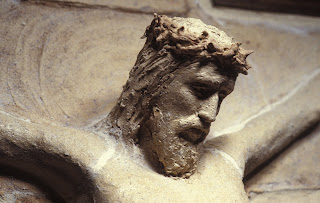 Palm Sunday - Sunday of the Passion
Palm Sunday - Sunday of the Passion
John 12:12-18, Matthew 27:11-66
Sunday - Riding on a beast of Burden
Friday – Carrying the burden of his own cross
Sunday – they laid their garments before him
Friday – they divided his garments among them
Sunday – They shouted Hosanna! Which means, “Save us”
Friday – They jeered, “He saved others but he can't save himself”
Sunday – the adulation, “Blessed is he!”
Friday – the hatred, “Crucify!”
Sunday – he prophesied correctly where and how the colt could be found.
Friday – the guards struck him and mocked, “prophesy – tell us who struck you”
Sunday – his disciples close at hand, preparing his way
Friday – his disciples forsake him, running away
Sunday – Palm branches strewn in honor
Friday – Thorns twisted into a shameful crown
Sunday – Crowds following and honoring him
Friday – Crowds crying for his blood
Sunday – he enters the temple in triumph
Friday – the temple curtain is torn in two
What a difference the better part of a week can make. Today is Palm Sunday – the day of our Lord's triumphal entry into the Holy City of Jerusalem. He had just raised Lazarus from the dead, to the amazement of many onlookers.
The excitement builds now, as he makes his approach to Jerusalem, and the air is filled with expectations of messianic proportions, also with the shouts and songs and praises of people who somehow recognized him for who he was. The Son of David. The Savior.
But what bitter irony the week would bring. They expected the establishment of his kingdom. They were looking for deliverance. And Jesus came to do all that. But not they way they expected.
If Palm Sunday brought glory, Good Friday brought shame. If Sunday brought joyous celebration, Good Friday would bring sorrow and grief. But in both these days, as in all days, Jesus is the Savior. Jesus is bringing salvation to his people. Jesus is glorified, not only in triumphal pageantry, but also in shameful suffering.
But know this – Palm Sunday was for you. And Good Friday was for you. All that Jesus does, is for you, and for all his people.
In this triumphant entry into Jerusalem, Jesus illustrates the establishment of his kingdom. Jesus, the king, comes.
Palm Sunday occurs, in a sense, each time our Lord enters the heart of a sinner, and is received in faith. Palm Sunday occurs when his kingdom is established and renewed by the preaching of his word and the administration of his sacraments. And Palm Sunday points forward, finally, to that final day to come, when he arrives in ultimate glory, in which every knee will bow and every tongue confess that Christ is Lord to the glory of the Father. Then he will ride no donkey, but the clouds themselves, accompanied by the angelic shout and trumpet call of God.
And in his triumph, we too shall triumph – over sin and death and the devil, all our enemies which are put the shame in his complete and eternal victory.
But Good Friday is for you, too, and for all. There, in shameful death, in sorrow and pain, our Lord died for the sins of the whole world, and for you sins. There he bore the punishment we deserve. There he shed his innocent blood that our guilty blood would not be shed. A perfect life to redeem untold sinful lives – the death of God's only Son to make us all his children forever. The crown of thorns, the flogging, the mocking, the betrayal, the denial, the forsaking, the nails, the spear, the nakedness, the thirst, the dishonor – all of it was for you. Yes Jesus hung on the cross in shame for you, just has he rode the donkey in glory for you.
And in the shame of the cross is an even greater glory than all the hosannas they sang. In the death of Jesus we see God's ultimate plan for the salvation of sinners – a plan to sacrifice his own Son, whom he loved, for a world of people that hated him. Could anything make less sense? Could anything be more divine?
On this Palm Sunday, join the ancient Jews in singing hosannas to the only one who can save us. And in this Holy Week, remember and appreciate all our Lord went through, for you. And next Sunday, we will celebrate an even greater glory, as Hosanna becomes Alleluia, and we mark his glorious Resurrection.

 The Resurrection of our Lord
The Resurrection of our Lord


 We've often mentioned how the mood of this season of Lent is more serious, contemplative, and even slightly somber. Today, it's Jesus who is even brought to tears at the grave of his friend Lazarus. Most of us know that this verse, John 11:35, “Jesus wept”, is the shortest in the Bible. But let's zero in on it today, especially, and there in our Savior's tears find a message of sin and grace.
We've often mentioned how the mood of this season of Lent is more serious, contemplative, and even slightly somber. Today, it's Jesus who is even brought to tears at the grave of his friend Lazarus. Most of us know that this verse, John 11:35, “Jesus wept”, is the shortest in the Bible. But let's zero in on it today, especially, and there in our Savior's tears find a message of sin and grace.